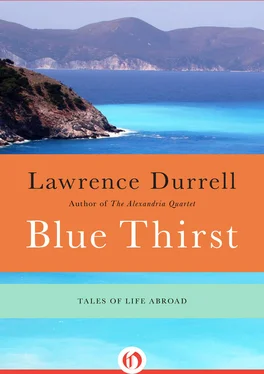But he was good. I did a paper which was received rather coolly when I left from the man who was going to inherit my post. It was called “Propaganda and Impropaganda.” Part of what I’m telling you today was in it. It was how, just as in business, you should know your victim, so to speak, so in propaganda you should either know the language of the person you’re dealing with or something about his beliefs and views so that you can influence him. Later in the war we got very skillful and we caused numberless suicides among the Japanese by printing a poem, an extraordinary, simple haiku poem with a moon and the Yellow River or something like that. Whole regiments surrendered in tears with this thing. It was done, of course, by a Japanese. No Englishman would’ve found it possible to do. At the very outbreak of the war in Cairo when I arrived there, the British community, to show their patriotism, had done something so foolish that I can hardly bear to speak about it. They printed a poster of a bulldog with a British flag ‘round its neck and the slogan, “Who is for liberty, Who is for victory?.” Now, at first sight it seems a very harmless thing, but the worst insult in Arabic is “dog”. And this was done by people who had been residents in Egypt for half a lifetime. They should have known that “ya kelb” is the worst insult an Arab can give or take. It would be like, you know, the French being particularly sensitive to being compared to pigs— “cochon” is the worst insult in French. Can you imagine at the beginning of an important war like that putting out a poster of a pig with the French flag around its neck and saying “Let’s all be patriotic pigs together for victory.”? You wouldn’t get a Frenchman to rally to that. Well, naturally, the English couldn’t understand why the Arabs were rolling about with laughter in the street when they saw this thing. And this was just the beginning of our war effort.
Diplomats speak good French in general, but owing to the rapid shift around they are limited: two years is just not enough to deal with a complicated language like, for instance, Japanese. In the old days you were more or less projected forward toward a country, often of your own choice. You were told, “Will you do five years in Japan?”, and you were given a handsome allowance and a Japanese instructor to teach you the language. So those in the old colonial service were all the experts; they knew the country with all its personalities, and got to love it very much. They were quite a different breed from modern diplomats who have spent two years here, two years there; and the service is more picturesque than really serious. Also it’s taken less seriously because of this element. I’m thinking, for example, of Sir Charles Bell’s mission to Tibet. No one had ever been to Tibet after Young-husband had conquered it in 1904. We established diplomatic ties with it and then Bell took a small group in, a chancery of five members. The first thing they noticed was that drink and cigarets were offensive to Buddhists. So the rule went out that there was one room in the Embassy where you could smoke a cigaret or have a drink; but to all intents and purposes they would never drink or smoke outside the premises, and certainly never in public. And owing to that one small consideration Bell became very friendly with the Dalai Lama and secured all the trade negotiations going at that time. He also secured all our supply lines up to the north — just one of one simple, tactful act. And that works even today.
The other day I was in Geneva and ran across a man whom I think I call “Hoyle” in one of my books. He’s a very venerable chap now in UNESCO who speaks beautiful Turkish and beautiful Greek, and has been in East Bahan for a hundred years — knows everybody, all the personalities, and is very gentle and sweet. And he said, “You know, I’ve got so bored with Geneva, not only the climate but also work in the U.N. is absolutely asinine — anybody would be qualified to do it. You have no idea how useless one feels as a diplomat. So I think that I’m going to the Congo, I see there’s a job going there.” And I said, “But listen, have you seen the evening’s paper?” He said, “Oh you mean about them eating the last mission?” I said, “Yes, you know the Balubas — they’re turning everybody into soup. You don’t want to go in there.” And he said, “Well, to be eaten by a Baluba — at least one would feel that one had served some purpose.”
But in justice to us, as usual, stag-legged and rather behind the times and really adrift, we hadn’t realised what propaganda was, you see, far less what impropaganda was. We knew the word agitprop and vaguely we had in our minds a sort of historical perspective on propaganda in general, But the Germans had set us a particular case. They set up a ministry of lies, and they were pumping out, like a Barnum Circus of absolutely flat, bare-faced lies, and they suddenly realised that, like a television commercial, if you repeat it long enough people don’t bother to question, they take it as true. We hadn’t realised this. We lived in a democracy where most of us lied negatively, not really by open intention, but by simple evasion, really, and where a free press rapidly ventilates problems and queries, particularly in England where you feel that if you write to the Times the whole thing will be settled. Not in the new Times, the old Times. The one that’s dead now, that you used to call “Auntie”. This propaganda question was a sort of characteristic fixation on our part and we suddenly had a brilliant idea about five years before the war when Goebbels was in full flood with the German propaganda machine. We thought we ought to make a distinction between propaganda and culture, and surely cultural penetration is what we really needed, what we really wanted because it would bring together all the most erudite and most instructed people in any given foreign community with our own instructed. We’d mutually agree to lend books to the universities and so on. This is all very well. This society, which is rather like a missionary society, was founded after a lot of argument, and the Queen agreed to be a patron. But the thing got so delayed that it was only after the outbreak of the war that it was actually launched. And this happened to be one of the master strokes of our policy because all of a sudden in Athens, in a very difficult position, a whole lot of young men in white knitted wool ties with copies of Keats in their pockets, and civilians to boot, at a time when everybody else was in uniform, suddenly arrived in Athens, opened institutes and started instantly teaching English and teaching Keats. Well, the Germans realised at once that the entire British Secret Service was at work, doubled all their effectives and kept a watch night and day on these innocent schoolmasters. Being German, of course, everything normal was suspicious. Sometimes I myself wondered whether we hadn’t been too clever and whether these teachers were not, after all, spies. Then when I joined them to give some lectures I realised it was the most innocent and absurd thing that could have happened. But they would choose the outbreak of the war to launch this organisation. It was called The British Council.
Naturally, the salaries were so low that the members were rather inferior. One had hopes that our general culture was going to be on a pretty high standard, but my boss for these lectures was sitting at his desk one day and asked me what I wanted to lecture about and I gave him some subjects which might please the Greeks when all of a sudden the accountant came in absolutely white and said “There is 10,000 pounds missing from the safe, sir.” This man, who was a clergyman said, after a moment of blankness, “Oh yes, my goodness, I think I have it here.” And he had. He had it all in his pocket. He had forgotten. He transferred all the petty cash to his pocket and he was only interested in ancient history. He was working on a book about Herodotus. And so the entire funds were in his pocket — I was horrified too because my salary was coming out of it. And then in Egypt I went ’round to see the British Council representative to find out if they’d like any lectures that could be done for the Middle East, political ones especially, and I met an extraordinary man, very gloomy, who said, “Where would you like to live if you really wanted to live somewhere, old man?” So I said, “Well, really, there’s only place I really want to live. That’s in France.” He said, “Why France?” I said, “Well, I can give you a number of reasons, but just take the simplest… food.” He said, “I thought you’d say that.” Then he said, bitterly, “Do you know I’ve crossed France frequently and I always carried my food in a paper bag because I was so badly swindled one day at lunch I decided I was never going to pay for another French meal?” And this man was our cultural representative! Needless to say I didn’t go any further with this thing at all. I went back to the embassy and I stayed there.
Читать дальше












